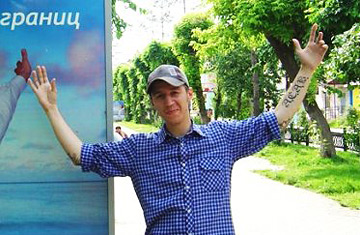
Ilya Borodenko
Ilya Borodenko's friends gathered at a hilltop park overlooking the smog-filled harbor of Nahodka, an industrial port city near Russia's border with China. The old graffiti on the park's low stone walls celebrating political punk bands testifies to the fact that they've often gathered here, although this time, stickers bearing Borodenko's face and the caption "1981-2007" reflect his absence. Borodenko's younger brother Pavel, shoulders hunched and hands jammed into pockets, lets others talk about Ilya — his dedication to liberal political causes, his inspirational role among activists in the area — before breaking in near the end of our conversation. "We are suffering greatly," he says of his family. "He was so lively and he helped with everything. People do not believe he is dead."
Less than two weeks earlier, Ilya Borodenko had traveled to the Siberian city of Angarsk, to join a growing protest against a plan to process nuclear waste in the town 100 km (62 miles) from Lake Baikal — the deepest freshwater lake in the world and Russia's finest environmental jewel. Early on the morning of July 21, according to Russian prosecutors, Borodenko's camp was attacked by at least 13 people wielding bats, knives and iron bars. Activists were beaten in their sleeping bags; those who could escape ran to get the police, who they would later claim were slow to arrive. Eight protesters were injured, one seriously. Borodenko, who had been standing guard and who took the first blows, suffered severe head injuries. He never regained consciousness.
Russia's environment is deteriorating — three of its cities recently made a Blacksmith Institute list of the world's 10 most polluted places — but activists complain that their activities are being restricted as Moscow cracks down on non-governmental organizations (NGOS) funded from abroad. But the clash that killed Borodenko may have been over more than just the environment. The 26-year-old was a left-wing political activist — an anti-fascist, or "anti-Fa," as his friends call themselves — and local authorities have confirmed that his killers were neo-Nazis. One witness at the camp told TIME by phone that the attackers shouted fascist slogans as they beat sleeping protesters. "They shouted 'anti-Fa cripples people' as they fought," says the activist, who only gave his first name Maxim. "They were dressed and looked like skinheads."
Clashes between skinheads and anti-Fa like Ilya are not uncommon. "In our city, we're used to neo-Nazis attacking us," says Vitali Logunov, 22. "We'll arrange a concert or a demonstration, and we might be attacked afterwards. They try to persuade people to live by Nazi slogans, and if they don't, they're in for a beating."
Logunov says he and his friends prefer non-violent persuasion. "They eat Asian food and all their clothes are made in Asia. [We try to prove to them that] it's not logical to be so racist."
Logical or not, youth extremism is on the rise in Russia, with some half a million young people now aligned with ultra-nationalist groups, according to a new report by the Moscow Human Rights Bureau. And in cities like Nahodka, in Russia's Far East, the target of the extremists' xenophobia is often the growing population of Asian migrants. Fear that Russia's declining population will be swamped, combined with President Vladimir Putin's readiness to stoke nationalistic passion for his own political ends, helps fuel violent extremism. "We think [nationalism] is developing more and more," says Logunov. "They try to manipulate people, and it's easier to manipulate people who are afraid."
Ilya Borodenko wasn't afraid, and it may have cost him his life. At the hilltop park in Nahodka, his friends marvel that people from as far away as Finland donated money to help ship Ilya's body home from Angarsk, and they plan to hold a benefit concert for his family. They've also put memorial stickers all around the city. But Ilya's energy is gone. "He was very popular, and he did a lot for the city," says Logunov. "He didn't have any enemies — except for the neo-Nazis."
